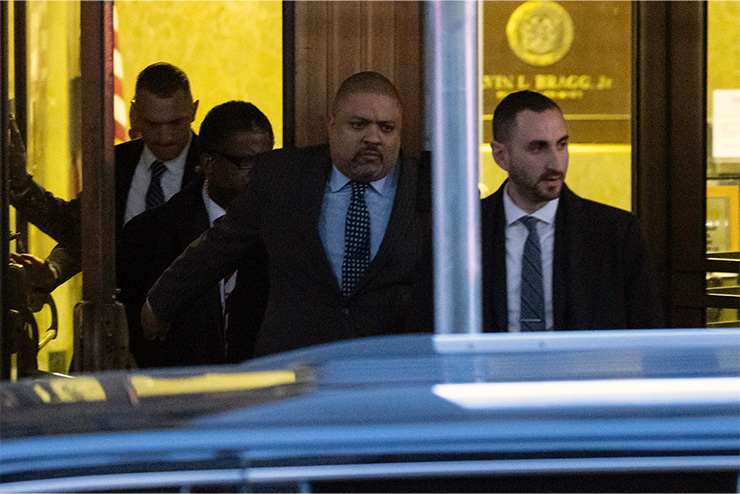Former President Donald J. Trump was indicted by a grand jury Thursday evening for his purported role during the 2016 election in bribing a porn star to keep silent about an alleged affair. It is the first time a former president has faced criminal charges. The indictment also represents the triumph of a school of progressive legal theory as practiced by the man behind the indictment, Manhattan District Attorney Alvin Bragg.
Bragg graduated from Harvard Law School, which is the intellectual center of a progressive legal movement born in the ’70s and ’80s called the Conference on Critical Legal Studies (CLS). CLS is part of the same philosophical movement that later spawned critical race theory (CRT). Many law students embraced the essential insight of the Crits (as the followers of the CLS movement came to be called) that all law is simply politics.
Trump’s indictment could only have been produced by someone who believes that there is no difference between law and politics. Bragg’s case is a flimsy one, as pointed out by even some Democrats, most notably Alan Dershowitz and Jonathan Turley, and by even more Republicans, including Trump’s potential political antagonist, Florida Governor Ron DeSantis, as well as Trump’s erstwhile ally and lawyer, former Manhattan federal prosecutor Rudy Giuliani.
The indictment remains under seal as of this writing, although there are reports that there are 30 counts of alleged business fraud, in particular the reporting as a legal expense of a $130,000 “hush payment” to porn star Stormy Daniels in exchange for her silence regarding an alleged one-night stand with Mr. Trump (which he denies).
Normally this kind of misreporting offense would be a misdemeanor under New York law. But if the alleged misreporting is employed to conceal evidence of a crime, it becomes a felony.
The difference is relevant because if the crime was a misdemeanor, it could not be prosecuted because there is a two-year statute of limitations for misdemeanors. Felonies, however, have a longer statute of limitations, and could conceivably still be prosecuted in this case.
The difficulty Bragg will face in bringing the case to trial is to demonstrate that Trump sought to conceal a violation of law. The purported legal violation in question is that the payment to Stormy Daniels was actually an expenditure of President Trump’s presidential campaign, designed to conceal unfavorable publicity that might have damaged his standing as a candidate, and unreported as a campaign contribution under federal law.
No court has ever before found such a federal offense and, indeed, former Democrat presidential candidate John Edwards was acquitted in a similar case involving a purported similar use of campaign funds, on the grounds that there might have been other motives than violating the federal election laws involved. In Trump’s case, he has indicated that while he denies any such involvement with Daniels, his people have hinted the payment in question was made (not originally by Trump, but by his then-lawyer) to avoid any odium that might come to Trump’s family, and not for any reason having to do with his campaign.
There is a chance that a New York or federal judge will quash the indictment, although this is probably unlikely. If the case goes to trial, the statute of limitations problem, the question of whether there was really any violation of federal law, and the further difficulty that several of the witnesses involved have acute credibility problems, should eventually result in a legal victory for Trump.
But this may not come for some time. Given the likely bias of a New York state jury, his vindication may have to await the appellate process, and this could take years. But the lack of legal merit of these charges, spawned as they were from the mind of a CLS acolyte, is beside the point.
Once upon a time, in the 18th, 19th, and early 20th centuries, the practice of law in the United States was regarded as a calling, a vocation in which one became a lawyer because one felt that was the way to serve God and one’s fellow men. Then, in the middle of the 20th century, Chief Justice Earl Warren’s Supreme Court essentially rewrote the Constitution in order to promote the politically popular goals of equality, redistribution, and personal self-actualization, rendering a series of decisions that undermined the traditional moral and religious underpinnings of American society.
As a result, law schools came to understand that prior law and tradition were not binding and that courts were “partners in legislation” with legislatures. From there, it was a natural progression to a legal theory like CLS that completely blurred the line between law and politics.
By following the CLS philosophy to its ultimate conclusion and making the courts a transparent political tool in a presidential election, Bragg has set a terrible precedent. Bringing a weak case against a 2024 presidential candidate for obviously political purposes, Bragg has breached the unwritten rule that, unlike in banana republics or Soviet Russia, America settles its political disputes at the ballot box and does not allow its courts to be used on dubious grounds to punish political enemies.
Much more can and will be said about this case, but we can conclude for now that March 30, 2023, the infamous day of Bragg’s indictment of Donald Trump, may mark the beginning of the triumph of CLS in the courts, and the beginning of the end of the rule of law in this country.

Leave a Reply